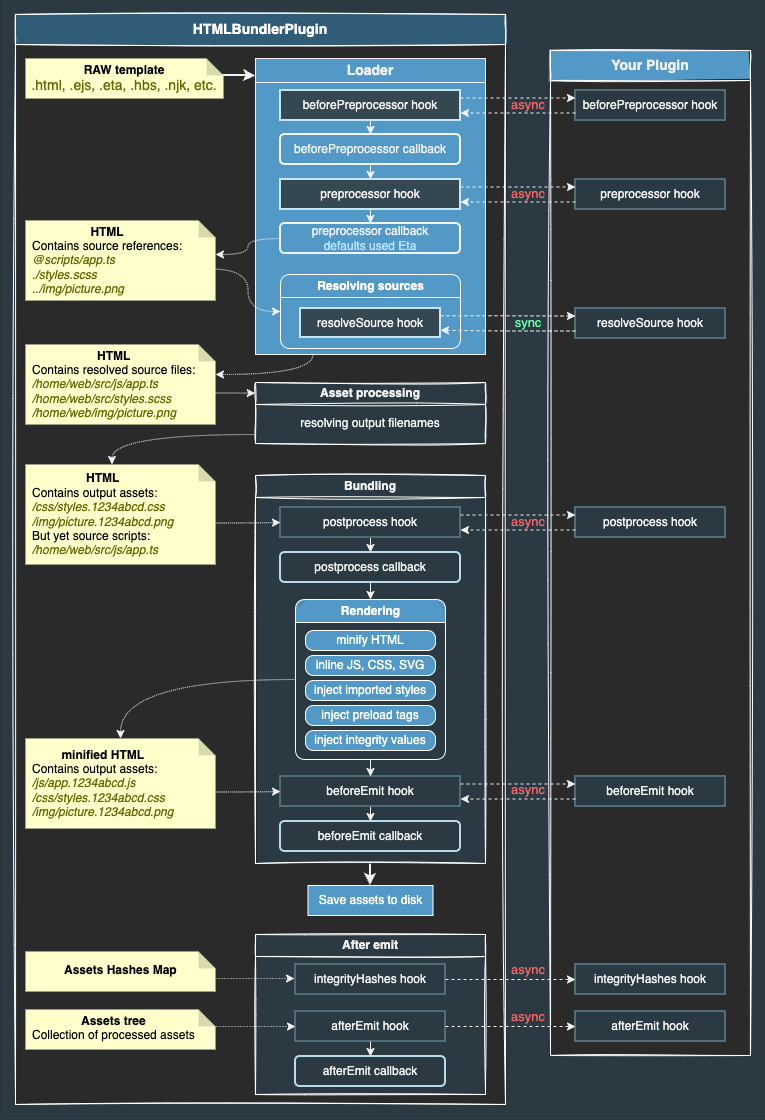Hooks & Callbacks
Using hooks and callbacks, you can extend the functionality of this plugin.
The hook can be defined in an external plugin.
The callback is defined as an option in the HTMLBundlerPlugin.
Most hooks have a callback with the same name. Each callback is called after hook with the same name. So with a callback, you can change the result of the hook.
When using callbacks
If you have small code just for your project or are doing debugging, you can use callbacks.
When using hooks
Using hooks you can create your own plugin.
How the plugin works under the hood.

How to use hooks
The simplest way, add the { apply() { ... } } object to the array of the Webpack plugins:
const HtmlBundlerPlugin = require('html-bundler-webpack-plugin');
module.exports = {
plugins: [
new HtmlBundlerPlugin({
entry: {
index: './src/index.html',
},
}),
// your plugin
{
apply(compiler) {
const pluginName = 'MyPlugin';
compiler.hooks.compilation.tap(pluginName, (compilation) => {
const hooks = HtmlBundlerPlugin.getHooks(compilation);
// modify generated HTML of the index.html template
hooks.beforeEmit.tap(pluginName, (content, { name, sourceFile, assetFile }) => {
return content.replace('something...', 'other...')
});
});
},
},
],
};
You can use this template as the basis for your own plugin:
const HtmlBundlerPlugin = require('html-bundler-webpack-plugin');
class MyPlugin {
pluginName = 'my-plugin';
options = {};
/**
* @param {{ enabled: boolean | 'auto'}} options The options of your plugin.
*/
constructor(options = {}) {
this.options = options;
}
apply(compiler) {
// you can use the API of the HtmlBundlerPlugin.option
const enabled = HtmlBundlerPlugin.option.toBool(this.options?.enabled, true, 'auto');
const outputPath = HtmlBundlerPlugin.option.getWebpackOutputPath();
if (!enabled) {
return;
}
const { pluginName } = this;
const { webpack } = compiler; // instance of the Webpack
const fs = compiler.inputFileSystem.fileSystem; // instance of the Webpack FileSystem
// start your plugin from the webpack compilation hook
compiler.hooks.compilation.tap(pluginName, (compilation) => {
const hooks = HtmlBundlerPlugin.getHooks(compilation);
// usage of the sync, async and promise hooks
// sync hook
hooks.<hookName>.tap(pluginName, (...arguments) => {
// do somthing here ...
const result = 'your result';
// return the result
return result;
});
// async hook
hooks.<hookName>.tapAsync(pluginName, (...arguments, callback) => {
// do somthing here ...
const result = 'your result';
// call the callback function to resolve the async hook
callback(result);
});
// promise hook
hooks.<hookName>.tapPromise(pluginName, (...arguments) => {
// do somthing here ...
const result = 'your result';
// return the promise with the result
return Promise.resolve(result);
});
});
}
}
module.exports = MyPlugin;
Then add your plugin in the webpack config:
const HtmlBundlerPlugin = require('html-bundler-webpack-plugin');
const MyBundlerPlugin = require('my-bundler-plugin');
module.exports = {
plugins: [
new HtmlBundlerPlugin({
entry: {
index: './src/index.html',
},
}),
// your plugin
new MyBundlerPlugin({ enabled: true });
],
};
For an example implementation see FaviconsBundlerPlugin.
Hooks
beforePreprocessor
AsyncSeriesWaterfallHook<[
content: string,
loaderContext: LoaderContext<Object> & { data: { [key: string]: any } | string }
]>;
For details on AsyncSeriesWaterfallHook see the hook interface.
For details on hook parameters, see in the beforePreprocessor callback option.
preprocessor
AsyncSeriesWaterfallHook<[
content: string,
loaderContext: LoaderContext<Object> & { data: { [key: string]: any } | string }
]>;
For details on AsyncSeriesWaterfallHook see the hook interface.
For details on hook parameters, see in the preprocessor callback option.
resolveSource
SyncWaterfallHook<[
source: string,
info: {
type: 'style' | 'script' | 'asset';
tag: string;
attribute: string;
value: string;
resolvedFile: string;
issuer: string
},
]>;
no calback
Called after resolving of a source attribute defined by source loader option.
For details on SyncWaterfallHook see the hook interface.
Hook parameters:
source- a source of the tag where are parsed attributes, e.g.<link href="./favicon.png" rel="icon">info- an object with parsed information:type- the type of the tagtag- the tag name, e.g.'link','script','img', etc.attribute- the attribute name, e.g.'src','href', etc.value- the attribute valueresolvedFile- the resolved file from the valueissuer- the template file
Return a string to override the resolved value of the attribute or undefined to keep the resolved value.
postprocess
AsyncSeriesWaterfallHook<[content: string, info: TemplateInfo]>;
For details on AsyncSeriesWaterfallHook see the hook interface.
For details on hook parameters, see in the postprocess callback option.
beforeEmit
AsyncSeriesWaterfallHook<[content: string, entry: CompileEntry]>;
For details on AsyncSeriesWaterfallHook see the hook interface.
For details on hook parameters, see in the beforeEmit callback option.
afterEmit
AsyncSeriesHook<[entries: CompileEntries]>;
For details on AsyncSeriesHook see the hook interface.
For details on hook parameters, see in the afterEmit callback option.
integrityHashes
AsyncSeriesHook<{
// the map of the output asset filename to its integrity hash
hashes: Map<string, string>;
}>;
Called after all assets have been processed and hashes have finite values and cannot be changed, at the afterEmit stage.
This can be used to retrieve the integrity values for the asset files.
For details on AsyncSeriesHook see the hook interface.
Callback Parameter: hashes is the map of the output asset filename to its integrity hash.
The map only contains JS and CSS assets that have a hash.
You can write your own plugin, for example, to extract integrity values into the separate file:
const fs = require('fs');
const path = require('path');
const HtmlBundlerPlugin = require('html-bundler-webpack-plugin');
module.exports = {
output: {
crossOriginLoading: 'anonymous', // required for Subresource Integrity
},
plugins: [
new HtmlBundlerPlugin({
entry: {
index: './src/index.html',
},
js: {
filename: '[name].[contenthash:8].js',
chunkFilename: '[name].[contenthash:8].chunk.js',
},
css: {
filename: '[name].[contenthash:8].css',
chunkFilename: '[name].[contenthash:8].chunk.css',
},
integrity: 'auto',
}),
// your plugin to extract the integrity values
{
apply(compiler) {
compiler.hooks.compilation.tap('MyPlugin', (compilation) => {
const hooks = HtmlBundlerPlugin.getHooks(compilation);
hooks.integrityHashes.tapAsync(
'MyPlugin',
(hashes) => Promise.resolve().then(() => {
if (hashes.size > 0) {
const saveAs = path.join(__dirname, 'dist/integrity.json');
const json = Object.fromEntries(hashes);
fs.writeFileSync(saveAs, JSON.stringify(json, null, ' ')); // => save to file
console.log(hashes); // => output to console
}
})
);
}
);
},
},
],
};
The content of the dist/integrity.json file looks like:
{
"815.49b3d882.chunk.js": "sha384-dBK6nNrKKk2KjQLYmHZu6tuWwp7kBzzEvdX+4Ni11UzxO2VHvP4A22E/+mmeduul",
"main.9c043cce.js": "sha384-AbfLh7mk6gCp0nhkXlAnOIzaHeJSB8fcV1/wT/FWBHIDV7Blg9A0sukZ4nS3xjtR"
"main.dc4ea4af.chunk.css": "sha384-W/pO0vwqqWBj4lq8nfe+kjrP8Z78smCBttkCvx1SYKrVI4WEdJa6W6i0I2hoc1t7",
"style.47f4da55.css": "sha384-gaDmgJjLpipN1Jmuc98geFnDjVqWn1fixlG0Ab90qFyUIJ4ARXlKBsMGumxTSu7E",
}